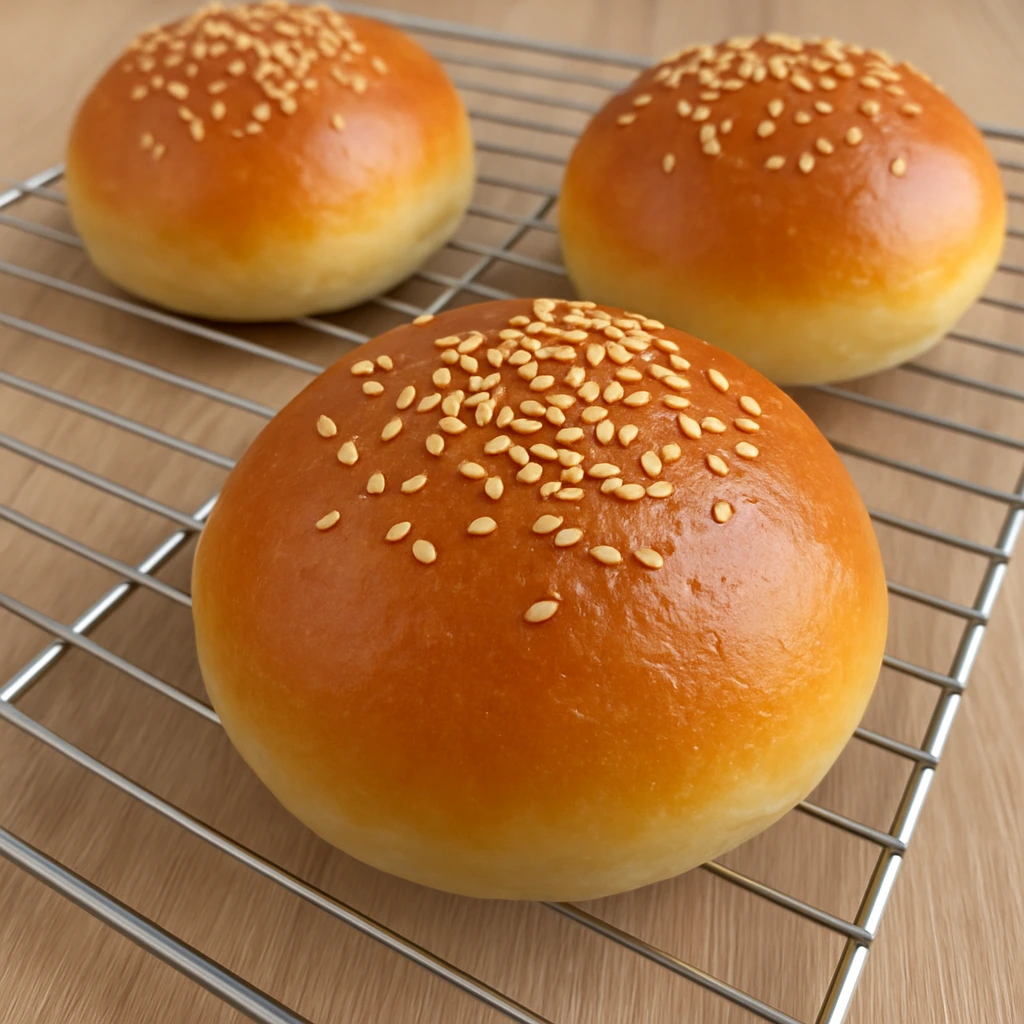homemade hamburger buns
Soft, golden, and irresistibly fluffy — this hamburger bun is the perfect base for any gourmet burger. Its smooth, tender crumb melts in your mouth, while the light crust adds just the right amount of structure without overpowering the filling. Whether lightly toasted or served fresh, it holds together beautifully, even with juicy toppings and generous sauces.
Its subtle flavor enhances every bite, complementing meats, vegetables, and condiments alike. This bun is not just a carrier — it’s a vital part of the burger experience. From the first warm touch to the final satisfying chew, it brings comfort, elegance, and that unmistakable artisan quality to your table.
Perfect for backyard barbecues, homemade creations, or restaurant-level burgers, it elevates even the simplest ingredients into something memorable. Once you try this bun, no other will do — it’s the soft, pillowy crown your burger deserves.
Ingredients for Hamburger Buns
(Yields approx. 15–20 medium buns)
| Ingredient | Exact Quantity | Function & Notes |
|---|---|---|
| All-purpose flour (T45/T55) | 1 kg | The structure of the dough. Choose a flour with moderate-to-high gluten content for a soft yet strong bun. |
| Fine salt | 20 g | Enhances flavor and regulates yeast activity. Do not mix directly with the yeast. |
| Fresh baker’s yeast | 30 g | Leavens the dough and adds volume. If using dry yeast, reduce to approx. 10 g. |
| Water (lukewarm) | 400 g | Hydrates the dough. Ideally between 25–30°C to help activate the yeast without killing it. |
| Granulated sugar | 100 g | Adds sweetness, feeds the yeast, and promotes browning during baking. |
| Whole eggs | 100 g (~2 eggs) | Contribute richness, tenderness, and color. Bind the dough and enhance flavor. |
| Unsalted butter | 100 g | Adds softness, a rich mouthfeel, and a light brioche flavor. Should be added cold or slightly softened at the end of kneading. |
Pro Chef Tips:
Baking: Preheat oven to 180°C (356°F) and bake for 15–20 minutes depending on size, until deeply golden.
Mixing: Start slow, then knead at medium speed until the dough is smooth and elastic. Gluten development is key.
Butter incorporation: Add butter after the dough is well-formed, so it doesn’t hinder gluten structure. Add it in small chunks.
First rise (bulk fermentation): Let the dough rise at room temperature for 1.5 to 2 hours, or until doubled in size.
Shaping: Divide into balls of 80–100 g each for standard buns. Keep the tops smooth.
Second rise (proofing): Let the shaped buns rise for another 45 minutes to 1 hour.
Egg wash: Brush with beaten egg before baking for a shiny, golden finish.
Complete Hamburger Bun Recipe (Brioche Style)
Total Time: ~3.5 to 4 hours
Active time: 45 mins | Resting & proofing: ~3 hours
Baking time: 15–20 minutes
1. Prepare the Dough
In a stand mixer bowl (or large mixing bowl):
- Add 1 kg flour.
- Add 100 g sugar and 20 g salt on opposite sides of the bowl.
- Crumble 30 g fresh yeast (or 10 g dry yeast) into the center.
- Pour in 400 g lukewarm water (25–30°C).
- Add 100 g whole eggs (about 2 large eggs).
Mix on low speed for 4–5 minutes until a rough dough forms.
🧈 2. Add Butter (Final Kneading)
- Cut 100 g unsalted butter into small pieces (cold or soft).
- Add the butter slowly while kneading on medium speed.
- Continue kneading for 10–15 minutes, until the dough is smooth, stretchy, and not sticky.
You should be able to stretch it gently without tearing (windowpane test).
3. First Rise (Bulk Fermentation)
- Cover the dough with a clean cloth or plastic wrap.
- Let it rise at room temperature for 1.5 to 2 hours, or until doubled in size.
(Optional: Place in a slightly warm oven – 28–30°C – to speed up rising.)
4. Shaping the Buns
- Punch down the dough gently to remove excess gas.
- Divide into 80–100 g portions (for standard burger size).
- Shape into tight, smooth balls by folding the edges underneath.
- Place them on a tray lined with parchment paper, spacing them apart.
5. Final Proofing (Second Rise)
- Cover the buns lightly with a cloth.
- Let them rise again for 45 minutes to 1 hour, or until puffy and light.
6. Egg Wash + Optional Toppings
- Brush each bun gently with beaten egg (1 egg + pinch of salt).
- Optional: Sprinkle with sesame seeds, poppy seeds, or oats for decoration.
7. Baking
- Preheat oven to 180°C (356°F).
- Bake the buns for 15 to 20 minutes, or until golden brown on top and hollow-sounding when tapped underneath.
- Let cool on a rack before slicing.
Storage Tips
- Store in an airtight container for up to 3 days at room temperature.
- Can be frozen up to 2 months — wrap individually and reheat slightly before serving.
Conclusion
Making your own hamburger buns is more than just baking — it’s elevating your burgers from ordinary to unforgettable. These soft, golden, brioche-style buns offer the perfect balance of texture, flavor, and structure. Whether you’re hosting a BBQ, building a gourmet burger, or simply craving bakery-quality bread at home, this recipe delivers every time.
Once you taste the result, you’ll never go back to store-bought buns again. Soft inside, slightly crisp on the outside, and full of rich flavor — your burgers deserve nothing less.
Frequently Asked Questions (Q&A)
Q: Can I use dry yeast instead of fresh yeast?
A: Yes! Use about 10–11 g of dry yeast in place of 30 g of fresh yeast. Mix it directly with the flour.
Q: Can I use milk instead of water?
A: Absolutely. Milk will make the crumb even softer and slightly sweeter. Use the same amount (400 g).
Q: How do I make the buns shinier on top?
A: Brush them with egg wash before baking. For an extra glossy look, apply a second layer halfway through baking.
Q: Can I make the dough ahead of time?
A: Yes! After kneading, cover and refrigerate the dough overnight. Let it warm up 30–60 minutes before shaping.
Q: How long can I freeze them?
A: Once baked and cooled, freeze buns for up to 2 months. Reheat slightly before serving for best texture.
https://briochechic.com/perfect-homemade-donuts/. What is Gluten and Why It Matters in Baking – King Arthur Baking

